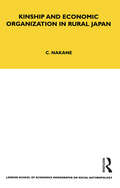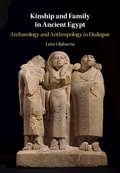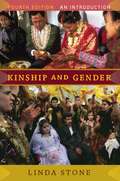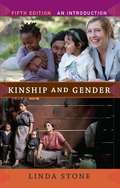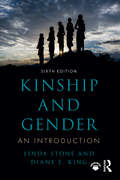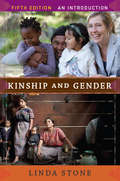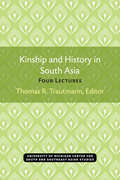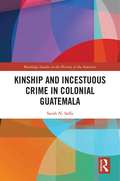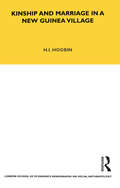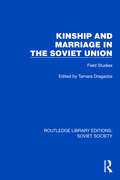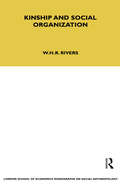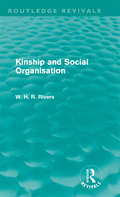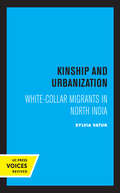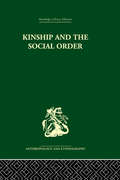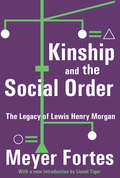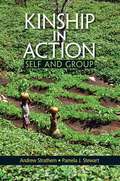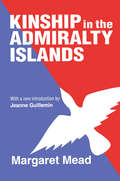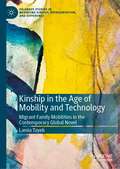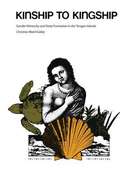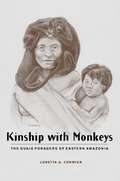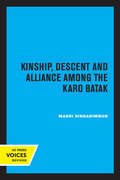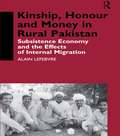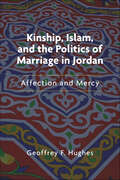- Table View
- List View
Kinship and Economic Organisation in Rural Japan (LSE Monographs on Social Anthropology #Vol. 32)
by Chie NakaneIn this essay the author presents the principles of one important sector of social organization in Japan, and establish its framework. Japanese kinship structure, with its multiple historical and local factors, and unlike that of the Chinese or of the Hindus, does not belong to the category of unilineal systems, nor to any kind of descent pattern found in the published literature of social anthropology. Social anthropology, developed by micro-synchronic studies of simpler societies, and with its major analysis devoted to descent systems, has to face in Japan a critical methodological test. In this essay, the author, as a social anthropologist, want to overcome these drawbacks of anthropological method, and to demonstrate one of the new approaches by which an anthropologist can cope with the data from a sophisticated society
Kinship and Family in Ancient Egypt: Archaeology and Anthropology in Dialogue
by Leire OlabarriaIn this interdisciplinary study, Leire Olabarria examines ancient Egyptian society through the notion of kinship. Drawing on methods from archaeology and sociocultural anthropology, she provides an emic characterisation of ancient kinship that relies on performative aspects of social interaction. Olabarria uses memorial stelae of the First Intermediate Period and the Middle Kingdom (ca.2150–1650 BCE) as her primary evidence. Contextualising these monuments within their social and physical landscapes, she proposes a dynamic way to explore kin groups through sources that have been considered static. The volume offers three case studies of kin groups at the beginning, peak, and decline of their developmental cycles respectively. They demonstrate how ancient Egyptian evidence can be used for cross-cultural comparison of key anthropological topics, such as group formation, patronage, and rites of passage.
Kinship and Gender
by Linda StoneDesigned for undergraduate courses in kinship, gender, or the two combined, Linda Stone's Kinship and Gender is the product of years of teaching. The topic of kinship comes alive when linked to gender issues; conversely, the cross-cultural study o. . .
Kinship and Gender
by Linda StoneDoes kinship still matter in today's globalized, increasingly mobile world? Do family structures continue to influence the varied roles that men and women play in different cultures? Answering with a resounding "yes!", Linda Stone offers a lively introduction to and working knowledge of kinship. She firmly links these concepts to cross-cultural gender studies, illuminating the malleable nature of gender roles around the world and over time. Written to engage students, each chapter provides key terms and useful generalizations gleaned through cross-cultural research on the interplay of kinship and gender in both traditional societies and contemporary communities. Detailed case studies help students understand how such generalizations are experienced "in real life. " Stone also considers the ramifications of current social problems and recent developments in reproductive technology as she demonstrates the relevance of kinship and gender to students' lives. The fully-revised 5th edition features discussion of cross-cultural examples complimented by expanded coverage of kinship and gender dynamics within the United States. Stone considers current evolutionary research on kinship and gender, and offers new case studies addressing international adoptions and polygynous marriage. An entirely new chapter explores the globalization of kinship in the 21st century. The result is a broad and captivating exploration of anthropological approaches to family and gender.
Kinship and Gender, 4e
by Linda StoneDesigned for undergraduate courses in kinship, gender, or the two combined, Linda Stone's Kinship and Gender is the product of years of teaching. The topic of kinship comes alive when linked to gender issues; conversely, the cross-cultural study of gender benefits from a working knowledge of kinship. This essential book successfully merges these two disciplines, demonstrating their relevance to students' lives and enhancing students' understanding of other cultures. Fourteen case studies throughout the book illuminate the intricate connections between kinship and gender across a variety of cultural groups. The fourth edition features a new chapter that reveals how kinship structures and related gender roles underlie many current social problems around the world. Also new to this edition are two original case studies, discussion questions, and listings of useful websites to aid further research.
Kinship and Gender, 5e
by Linda StoneDoes kinship still matter in today's globalized, increasingly mobile world? Do family structures continue to influence the varied roles that men and women play in different cultures? Answering with a resounding "yes!", Linda Stone offers a lively introduction to and working knowledge of kinship. She firmly links these concepts to cross-cultural gender studies, illuminating the malleable nature of gender roles around the world and over time.Written to engage students, each chapter provides key terms and useful generalizations gleaned through cross-cultural research on the interplay of kinship and gender in both traditional societies and contemporary communities. Detailed case studies help students understand how such generalizations are experienced "in real life." Stone also considers the ramifications of current social problems and recent developments in reproductive technology as she demonstrates the relevance of kinship and gender to students' lives.The fully-revised 5th edition features discussion of cross-cultural examples complimented by expanded coverage of kinship and gender dynamics within the United States. Stone considers current evolutionary research on kinship and gender, and offers new case studies addressing international adoptions and polygynous marriage. An entirely new chapter explores the globalization of kinship in the 21st century. The result is a broad and captivating exploration of anthropological approaches to family and gender.
Kinship and Gender: An Introduction
by Linda Stone Diane E. KingDoes kinship still matter in today’s globalized, increasingly mobile world? Do family structures continue to influence the varied roles that men and women play in different cultures? Answering with a resounding ‘yes!’, Linda Stone and Diane E. King offer a lively introduction to and working knowledge of kinship. They firmly link these concepts to cross-cultural gender studies, illuminating the malleable nature of gender roles around the world and over time. Written to engage students, each chapter in Kinship and Gender provides key terms and useful generalizations gleaned through research on the interplay of kinship and gender in both traditional societies and contemporary communities. Detailed case studies and cross-cultural examples help students understand how such generalizations are experienced in real life. The authors also consider the ramifications of current social problems and recent developments in reproductive technology as they demonstrate the relevance of kinship and gender to students’ lives. The fully-revised sixth edition contains new case studies on foster parenting in the United States and on domestic violence. It provides new material on pets as family members and an expanded discussion of the concept of lineal masculinity. There is also a comparison of the adoption of new reproductive technologies in Israel with other countries, along with a discussion of the issue of transnational movements in the use of these technologies.
Kinship and Gender: An Introduction
by Linda StoneDoes kinship still matter in today's globalized, increasingly mobile world? Do family structures continue to influence the varied roles that men and women play in different cultures? Answering with a resounding ?yes!?, Linda Stone offers a lively introduction to and working knowledge of kinship. She firmly links these concepts to cross-cultural gender studies, illuminating the malleable nature of gender roles around the world and over time.Written to engage students, each chapter provides key terms and useful generalizations gleaned through cross-cultural research on the interplay of kinship and gender in both traditional societies and contemporary communities. Detailed case studies help students understand how such generalizations are experienced ?in real life.? Stone also considers the ramifications of current social problems and recent developments in reproductive technology as she demonstrates the relevance of kinship and gender to students' lives.The fully-revised fifth edition features discussion of cross-cultural examples complimented by expanded coverage of kinship and gender dynamics within the United States. Stone considers current evolutionary research on kinship and gender, and offers new case studies addressing international adoptions and polygynous marriage. An entirely new chapter explores the globalization of kinship in the 21st century. The result is a broad and captivating exploration of anthropological approaches to family and gender.
Kinship and History in South Asia: Four Lectures (Michigan Papers On South And Southeast Asia)
by Thomas R. TrautmannKinship and History in South Asia presents four papers given at a small conference of kinship studies scholars, “Kinship and History in South Asia,” at the University of Toronto in 1973. They draw upon one another and show several common concerns, particularly the theoretical importance of Dravidian systems. Yey they remain specialist studies, each within its own raison d’être. Brendra E. F. Beck contributes a study of the “kinship nucleus” in Tamil folklore, Levi-Straussian both in its treatment of kinship and of mythology. George L. Hart’s study of woman and the sacred in the ancient Tamil literature of the Sangam attempts to elucidate this literature in its own terms, and also to relate it to Beck’s “kinship nucleus.” Thomas R. Trautmann presents a critical examination of the evidence for cross-cousin marriage in early North India, attempting to determine historical fact from literary materials. Narendra K. Wagle offers a survey of the kinship categories to be found in the Pali Jatakas.
Kinship and Incestuous Crime in Colonial Guatemala
by Sarah N. SaffaKinship and Incestuous Crime in Colonial Guatemala examines social relations in colonial Guatemala through the lens of incest. Using a combination of qualitative and quantitative analyses of incest trials from the Spanish secular courts, this study shows that incest codes were not homogenous nor were its various forms equally condemned. Further, incest codes and the criminal process impacted the articulation of kinship and contributed to the racialization of kin behavior. Colonial actors of all sorts were proficient at using these types of distinctions as they negotiated various crises in their lives. The models of relatedness created within incestuous crime ultimately foreshadowed changes in marriage proscriptions and continued racial polarization following independence from Spain. Overall, this study demonstrates how the lens of incest can add further nuance to our understanding of social relations in a given area. Incest codes force latent divisions between kin to the surface and can provide individuals with multiple avenues to creatively manage interpersonal relationships. They also afford a fruitful arena in which to explore social inequalities in society and mechanisms of culture change. This book will appeal to anyone interested in Latin America or engaged in the fields of kinship, gender, or sexuality studies.
Kinship and Marriage in a New Guinea Village (London School Of Economics Monographs On Social Anthropology Ser. #Vol. 26)
by H. Ian HogbinThe economic and political systems, legal code and religious beliefs of the people of the New Guinea village of Busama were analysed by H. Ian Hogbin in his earlier work, Transformation Scene (1951). In this new study founded on field work carried out at intervals over a seven year period, he is concerned primarily with the individual in his relations with the kinship structure. He takes a typical Busama through a full span of life, from birth through infancy, childhood, adolescence, and marriage to maturity and death; and he shows how each stage in the individual's life involves a change in his kinship relationships and responsibilities. This approach gives the professional anthropologist a set of carefully presented data analysed in line with the contemporary emphasis on seeing the relations between kin in the context of the local community, and it also offers the general reader an enjoyable and authentic account of the intimacies of Melanesian life.
Kinship and Marriage in the Soviet Union: Field Studies (Routledge Library Editions: Soviet Society)
by Tamara DragadzeKinship and Marriage in the Soviet Union (1984) presents articles by established Soviet anthropologists, writing on kinship and marriage in the countries of the USSR. They represent all the main Soviet regions and display the way in which scholars handle their data within a particular theoretical framework. The collection demonstrates both the style of Soviet scholars who write in social anthropology, and the richness of living traditions among the diverse nationalities of the Soviet Union.
Kinship and Social Organisation
by W. H. RiversW. H. R. Rivers, who has been called 'the founder of the modern study of social organization', exerted an immense influence on his contemporaries and successors. This volume reprints three of his lectures, delivered in 1913 and first published in 1914, which provide a short and brilliant exposition of his theoretical approach, and are exemplary of his handling of ethnographic evidence. His theme is the relationship between kinship terminologies and social organization, more particularly forms of marriage, a subject still of lively theoretical interest. Also included is the same author's The Genealogical Method of Anthropological Enquiry, first published in 1910, a classic of anthropological methodology, and Professor Raymond Firth of the London School of Economics and Professor David Schneider of the University of Chicago provide commentaries estimating the past and present importance of Rivers in British and American Anthropology respectively.
Kinship and Social Organisation (Routledge Revivals #Vol. 34)
by W. H. RiversFirst published in 1914, W. H. R. Rivers' hugely influential study was the first to effectively demonstrate the close connection between methods of denoting relationship or kinship and forms of social organisation, including those based on different forms of the institution of marriage. He also shows that the terminology of relationship has been rigorously determined by social conditions and that, therefore, systems of relationship furnish us with a most valuable instrument in studying the history of social institutions. This series of lectures was originally delivered by the author in May 1914, at the London School of Economics. They are based on the experiences of the Percy Sladen Trust Expedition to Melanesia in 1908.
Kinship and Urbanization: White-Collar Migrants in North India (Center for South and Southeast Asia Studies, UC Berkeley)
by Sylvia VatukThis title is part of UC Press's Voices Revived program, which commemorates University of California Press’s mission to seek out and cultivate the brightest minds and give them voice, reach, and impact. Drawing on a backlist dating to 1893, Voices Revived makes high-quality, peer-reviewed scholarship accessible once again using print-on-demand technology. This title was originally published in 1972.
Kinship and the Social Order.: The Legacy of Lewis Henry Morgan
by Meyer FortesOriginally published in the UK in 1970. The central argument of this book is that the structuralist theory and method developed by British and American anthropologists in the study of kinship and social organization are the direct descendants of the researches of Lewis Henry Morgan. Re-examining Morgan's work, the book demonstrates how a tradition of mis-interpretation has disguised the true import of Morgan's discoveries and ideas for Rivers and Radcliffe-Brown and the generation of anthropologists inspired by them.
Kinship and the Social Order: The Legacy of Lewis Henry Morgan
by Meyer FortesOne of the world's most eminent social anthropologists draws upon his many years of study and research in the field of kinship and social organization to review the development of anthropological theory and method from Lewis Henry Morgan (1818-1881) to anthropologists of the 1960s. It is the central argument of this book that the structuralist theory and method developed by British and American anthropologists in the study of kinship and social organization is the direct descendant of Morgan's researches. The volume starts with a re-examination of Morgan's work. Professor Fortes demonstrates how a tradition of misinterpretation has disguised the true import of Morgan's discoveries. He follows with a detailed analysis of the work of Rivers and Radcliffe-Brown and the generation of anthropologists inspired by them. The author states his own point of view as it has developed in the framework of modern structuralist theory, with ethnographic examples examined in depth. He shows that the social relations and institutions conventionally grouped under the rubric of kinship and social organization belong simultaneously to two complementary domains of social structure, the familial and the political. Meyer Fortes' contribution to the field of anthropology can best be understood in the context of balance of forces between these domains of the personal and public. In the latter part of the book, he gives detailed attention to the principal conceptual issues that have confronted research and theory in the study of kinship and social organizations since Morgan's time. He shows that kinship institutions are autonomous, not mere by-products of economic requirements, and demonstrates the moral base of kinship in the rule of amity.
Kinship in Action: Self and Group
by Andrew Strathern Pamela J StewartFor courses in Social Organization, Kinship, and Cultural Ecology.Kinship has made a come-back in Anthropology. Not only is there a line of noted, general, introductory works and readers in the topic, but theoretical discussions have been stimulated both by technological changes in mechanisms of reproduction and by reconsiderations of how to define kinship in the most productive ways for cross-cultural comparisons.In addition, kinship studies have moved away from the minutiae of kin terminological systems and the “kinship algebra” often associated with these, to the broader analysis of processes, historical changes and fundamental cultural meanings in which kin relationships are implicated. In this changed, and changing context both Andrew Strathern and Pamela J. Stewart -- both of the University of Pittsburgh -- bring together a number of interests and concerns, in order to provide pointers for students, as well as scholars, in this field of study. Taking an explicitly processual approach, the authors examine definitions of terms such as kinship itself, approach the topic in a way that is invariably ethnographic, and deploy materials from field areas where they themselves have worked.
Kinship in the Admiralty Islands
by Jeanne GuilleminThe Manus of New Guinea's Pere village were Margaret Mead's most favored community, the people to whom she returned five times before she died in 1978. Kinship in the Admiralty Islands is the classic and only thorough description of their complex rules of marriage and family relations. It draws on Mead's 1928-1929 field work, conducted with her second husband, New Zealander Reo Fortune, and benefits by her being able to cross-check her data with his. Written in 1931, Kinship followed Mead's first and very popular book on the Manus, Growing Up in New Guinea, which was criticized by other anthropologists for being too general in scope. In Kinship Mead succeeded in demonstrating her thorough knowledge of this Melanesian group in the specific terms prized by her scholarly colleagues, while also describing in depth Manus social structure.Kinship in the Admiralty Islands describes an intricate system of social restraints and kinship ties and their impact on the local economy. The Manus' predilection for adoption, for example, allows surrogate fathers to make extended marriage payments, while in the next generation their adopted sons will take on the same responsibility for other young men in the new kin network. Mead reviews other kinship rules, such as avoidance behavior between in-laws of the opposite sex, early betrothals, other forms of adoption, and a range of deference behavior and joking relations among kin. In this work, Mead walks a fine line between functionalist kinship analysis of the British school of Radclife Brown and the cultural-and-personality orientation of Americans in the school of Franz Boas.Jeanne Guillemin's new introduction provides a lively in depth description of Margaret Mead's career in the early days of anthropology, the sometimes negative reactions of her contemporaries to her work, and her reasons for writing Kinship in the Admiralty Islands, as well as Mead's later reactions to how "her Manus" entered the modern world.Margaret Mead was noted for directing her writings to both scholar and laymen alike. Kinship in the Admiralty Islands will be of interest to anthropologists and general readers interested in the peoples of the South Pacific.Margaret Mead was curator of ethnology of the American Museum of Natural History. She was the author of many books including Continuities in Cultural Evolution (available from Transaction), The Study of Culture at a Distance, The Mountain of Arapesh, and From the South Seas: Studies of Adolescence and Sex in Primitive Societies. Jeanne Guillemin is a professor of anthropology at Boston College and editor of Anthropological Realities: Readings in the Science of Culture, also available from Transaction.
Kinship in the Age of Mobility and Technology: Migrant Family Mobilities in the Contemporary Global Novel (Palgrave Studies in Mediating Kinship, Representation, and Difference)
by Lamia TayebThis volume aims to address kinship in the context of global mobility, while studying the effects of technological developments throughout the 20th century on how individuals and communities engage in real or imagined relationships. Using literary representations as a spectrum to examine kinship practices, Lamia Tayeb explores how transnational mobility, bi-culturalism and cosmopolitanism honed, to some extent, the relevant authors’ concerns with the family and wider kinship relations: in these literatures, kinship and the family lose their familiar, taken-for-granted aspect, and yet are still conceived as ‘essential’ spheres of relatedness for uprooted individuals and communities. Tayeb here studies writings by Hanif Kureishi, Zadie Smith, Monica Ali, Jhumpa Lahiri, Khaled Housseini and Nadia Hashimi, working to understand how transnational kinship dynamics operate when moved beyond the traditional notions of the blood relationship, relationship to place and identification with community.
Kinship to Kingship: Gender Hierarchy and State Formation in the Tongan Islands
by Christine Ward GaileyHave women always been subordinated? If not, why and how did women's subordination develop? Kinship to Kingship was the first book to examine in detail how and why gender relations become skewed when classes and the state emerge in a society. Using a Marxist-feminist approach, Christine Ward Gailey analyzes women's status in one society over three hundred years, from a period when kinship relations organized property, work, distribution, consumption, and reproduction to a class-based state society. Although this study focuses on one group of islands, Tonga, in the South Pacific, the author discusses processes that can be seen through the neocolonial world. This ethnohistorical study argues that evolution from a kin-based society to one organized along class lines necessarily entails the subordination of women. And the opposite is also held to be true: state and class formation cannot be understood without analyzing gender and the status of women. Of interest to students of anthropology, political science, sociology, and women's studies, this work is a major contribution to social history.
Kinship with Monkeys: The Guajá Foragers of Eastern Amazonia (Historical Ecology Series)
by Loretta CormierIntrigued by a slide showing a woman breast-feeding a monkey, anthropologist Loretta A. Cormier spent fifteen months living among the Guajá, a foraging people in a remote area of Brazil. The result is this ethnographic study of the extraordinary relationship between the Guajá Indians and monkeys. While monkeys are a key food source for the Guajá, certain pet monkeys have a quasi-human status. Some infant monkeys are adopted and nurtured as human children while others are consumed in accordance with the "symbolic cannibalism" of their belief system.The apparent contradiction of this predator/protector relationship became the central theme of Cormier's research: How can monkeys be both eaten as food and nurtured as children? Her research reveals that monkeys play a vital role in Guajá society, ecology, economy, and religion. In Guajá animistic beliefs, all forms of plant and animal life—especially monkeys—have souls and are woven into a comprehensive kinship system. Therefore, all consumption can be considered a form of cannibalism.Cormier sets the stage for this enlightening study by examining the history of the Guajá and the ecological relationships between human and nonhuman primates in Amazonia. She also addresses the importance of monkeys in Guajá ecological adaptation as well as their role in the Guajá kinship system. Cormier then looks at animism and life classification among the Guajá and the role of pets, which provide a context for understanding "symbolic cannibalism" and how the Guajá relate to various forms of life in their natural and supernatural world. The book concludes with a discussion of the implications of ethnoprimatology beyond Amazonia, including Western perceptions of primates.
Kinship, Descent and Alliance among the Karo Batak
by Masri SingarimbunThe topic of this monograph is kinship and affinal relations among the Karo Batak. My reason for selecting this topic is my belief that an understanding of the Karo system of social relations between kin and relatives by marriage is the necessary starting point for an understanding of most other aspects of Karo culture and society. Moreover, the Karo kinship system is similar to the kinship systems of numerous other peoples—including other Batak—which have become the focus of considerable anthropological interest and much theoretical debate.—From the Preface This title is part of UC Press's Voices Revived program, which commemorates University of California Press’s mission to seek out and cultivate the brightest minds and give them voice, reach, and impact. Drawing on a backlist dating to 1893, Voices Revived makes high-quality, peer-reviewed scholarship accessible once again using print-on-demand technology. This title was originally published in 1975.
Kinship, Honour and Money in Rural Pakistan: Subsistence Economy and the Effects of International Migration
by Alain LefebvreInternational migration is favoured by the governments of many poorer countries despite often well-publicized abuses affecting individual migrant workers. Not only is local unemployment reduced but also it is expected that the migrants will learn new skills, with many even becoming entrepreneurs on their return home. Meantime they are seen as a source of foreign remittances, providing needed capital for economic development. Such is the attitude in Pakistan from where thousands of migrant workers leave every year for the Gulf states especially.An anthropological study approaching this issue from a local (village) level, this book focuses on two areas of the Punjab. Describing the historical passage of rural life from pre-colonial times to the present, it shows how the rural economy of the Punjab was not transformed by the green revolution - on the contrary, it is still a subsistence economy. The resulting poverty combined with Pakistan's labour-market policies forces many Punjabi men to seek work abroad, in turn bringing changes to the economic role of the women left behind. Remittances from abroad have brought further changes on the economic and social life of the villages but not, as expected, to bring economic development let alone capital or entrepreneurialism to the area.
Kinship, Islam, and the Politics of Marriage in Jordan: Affection and Mercy (Public Cultures Of The Middle East And North Africa Ser.)
by Geoffrey F. HughesIn Kinship, Islam, and the Politics of Marriage in Jordan, Geoffrey Hughes sets out to trace the "marriage crisis" in Jordan and the Middle East. Rapid institutional, technological, and intellectual shifts in Jordan have challenged the traditional notions of marriage and the role of powerful patrilineal kin groups in society by promoting an alternative ideal of romantic love between husband and wife. Drawing on many years of fieldwork in ruralJordan, Kinship, Islam, and the Politics of Marriagein Jordan provides a firsthand look at how expectations around marriage are changing for young people in the Middle East even as they are still expected to raise money for housing, bridewealth, and a wedding. Kinship, Islam, and the Politics of Marriage in Jordan offers an intriguing look at the contrasts between the traditional values and social practices of rural Jordanians around marriage and the challenges and expectations of young people as their families negotiate the concept of kinship as part of the future of politics, family dynamics, and religious devotion
